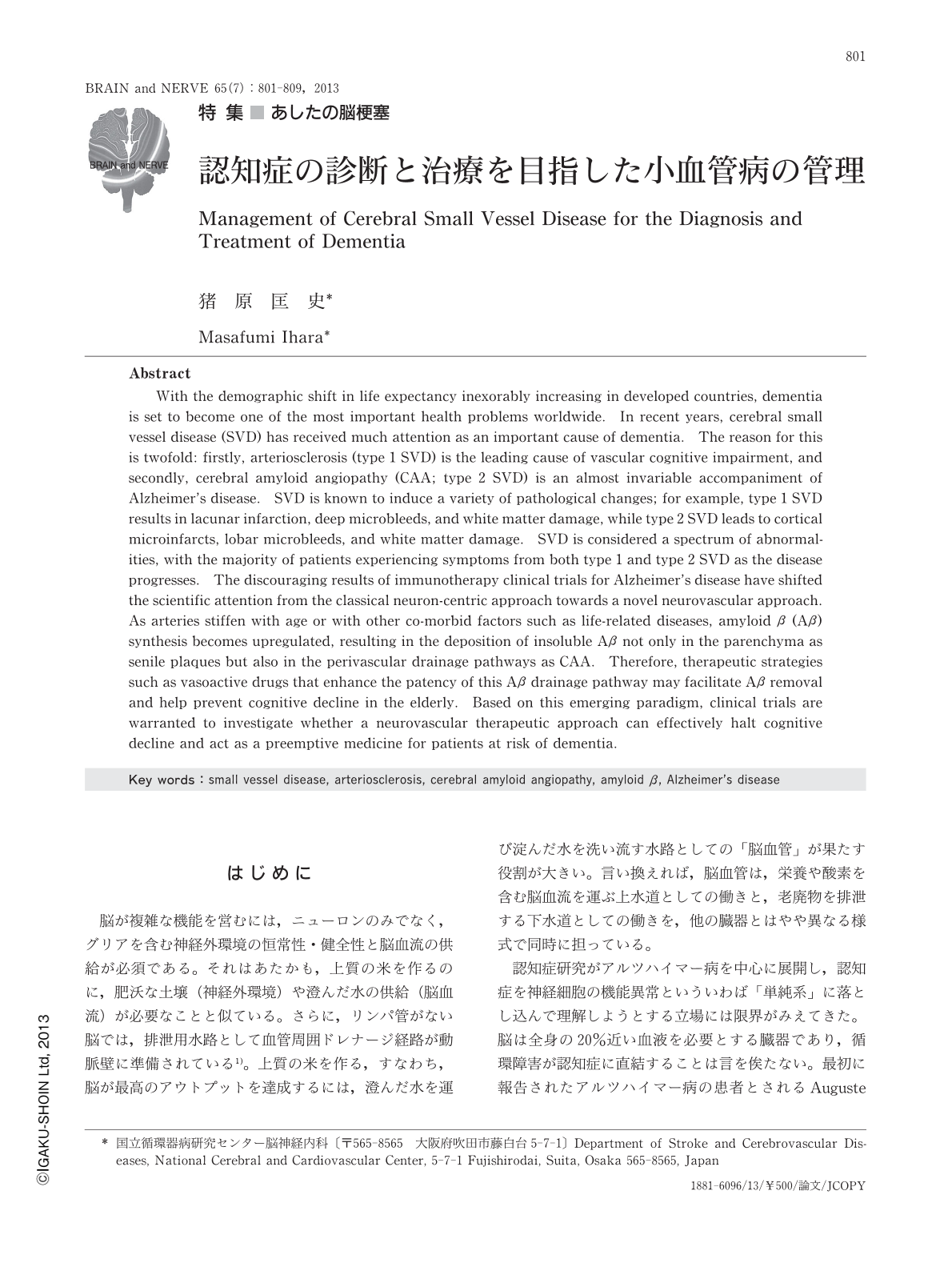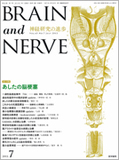Japanese
English
- 有料閲覧
- Abstract 文献概要
- 1ページ目 Look Inside
- 参考文献 Reference
はじめに
脳が複雑な機能を営むには,ニューロンのみでなく,グリアを含む神経外環境の恒常性・健全性と脳血流の供給が必須である。それはあたかも,上質の米を作るのに,肥沃な土壌(神経外環境)や澄んだ水の供給(脳血流)が必要なことと似ている。さらに,リンパ管がない脳では,排泄用水路として血管周囲ドレナージ経路が動脈壁に準備されている1)。上質の米を作る,すなわち,脳が最高のアウトプットを達成するには,澄んだ水を運び淀んだ水を洗い流す水路としての「脳血管」が果たす役割が大きい。言い換えれば,脳血管は,栄養や酸素を含む脳血流を運ぶ上水道としての働きと,老廃物を排泄する下水道としての働きを,他の臓器とはやや異なる様式で同時に担っている。
認知症研究がアルツハイマー病を中心に展開し,認知症を神経細胞の機能異常といういわば「単純系」に落とし込んで理解しようとする立場には限界がみえてきた。脳は全身の20%近い血液を必要とする臓器であり,循環障害が認知症に直結することは言を俟たない。最初に報告されたアルツハイマー病の患者とされるAuguste D.の診断は,実は血管性認知症であったともいわれる2)。高齢者の認知症に血管病が少なからず寄与することは,「ヒトは血管とともに老いる」という名言を借りるまでもない。イギリスの456例の剖検脳の解析から認知症への病理変化の寄与危険度を算出した結果,小血管病と多発性の血管病理の寄与危険度はそれぞれ12%と9%であり,神経原線維変化の11%,老人斑の8%を凌駕していた3)。
このように,高齢者の認知症を考えるうえで,血管の病理は極めて重要であり,本稿では特に小血管病について焦点を当てて認知症との関連を探り,その予防法と治療法について論じてみたい。なお本稿では,認知症との関連を論ずるにあたり,「脳」小血管病とすべきところも,血管病が全身性の疾患であるという意味合いを込めて,敢えて小血管病としたことをまずはお断りしておく。
Abstract
With the demographic shift in life expectancy inexorably increasing in developed countries, dementia is set to become one of the most important health problems worldwide. In recent years, cerebral small vessel disease (SVD) has received much attention as an important cause of dementia. The reason for this is twofold: firstly, arteriosclerosis (type 1 SVD) is the leading cause of vascular cognitive impairment, and secondly, cerebral amyloid angiopathy (CAA; type 2 SVD) is an almost invariable accompaniment of Alzheimer's disease. SVD is known to induce a variety of pathological changes; for example, type 1 SVD results in lacunar infarction, deep microbleeds, and white matter damage, while type 2 SVD leads to cortical microinfarcts, lobar microbleeds, and white matter damage. SVD is considered a spectrum of abnormalities, with the majority of patients experiencing symptoms from both type 1 and type 2 SVD as the disease progresses. The discouraging results of immunotherapy clinical trials for Alzheimer's disease have shifted the scientific attention from the classical neuron-centric approach towards a novel neurovascular approach. As arteries stiffen with age or with other co-morbid factors such as life-related diseases, amyloid β (Aβ) synthesis becomes upregulated, resulting in the deposition of insoluble Aβ not only in the parenchyma as senile plaques but also in the perivascular drainage pathways as CAA. Therefore, therapeutic strategies such as vasoactive drugs that enhance the patency of this Aβ drainage pathway may facilitate Aβ removal and help prevent cognitive decline in the elderly. Based on this emerging paradigm, clinical trials are warranted to investigate whether a neurovascular therapeutic approach can effectively halt cognitive decline and act as a preemptive medicine for patients at risk of dementia.

Copyright © 2013, Igaku-Shoin Ltd. All rights reserved.


